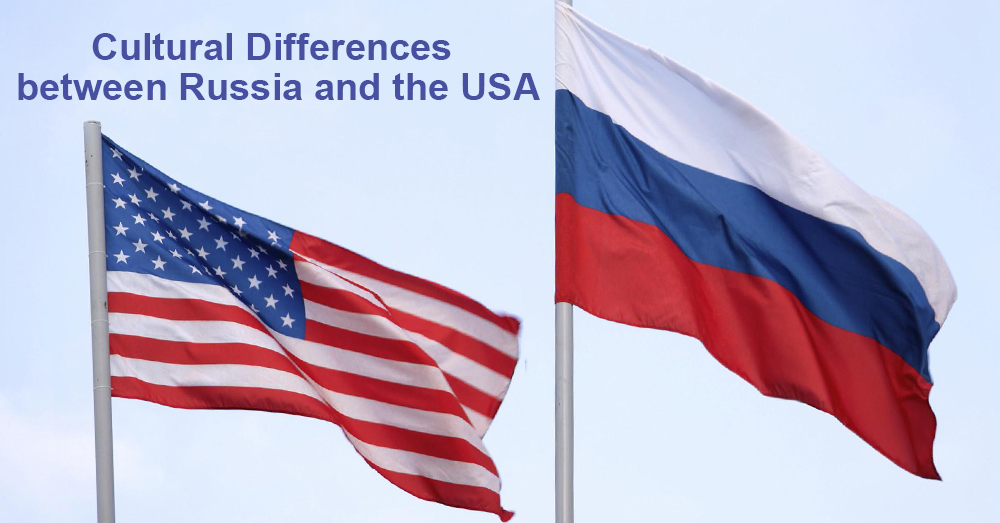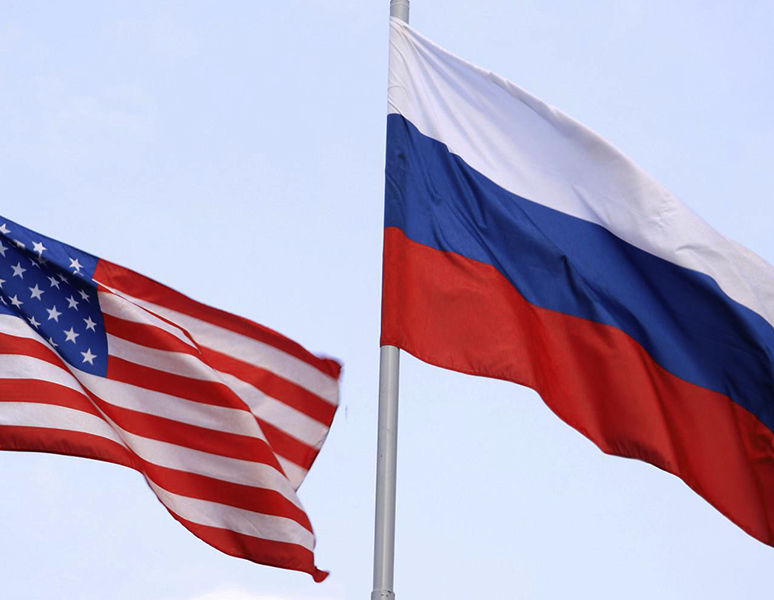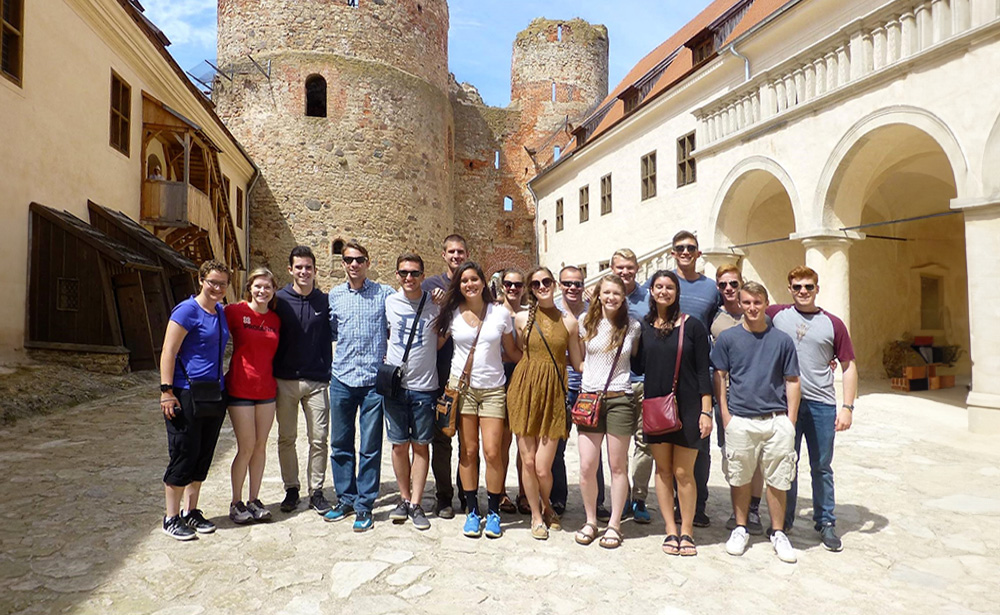Cultural Differences between Russia and the USA

Everyone who has travelled at least once in their life knows that from time to time you come across a situation when following common rules, you face misunderstanding or put yourself in an awkward situation. As a rule, these are common everyday situations which you can face daily. The reason for this is cultural differences. Therefore, we decided to find out what differences there are between Russian and American cultures and to tell you about them.
We tried not to base on our own assumptions but to look at the situation objectively. On the Internet, we found opinions of Americans who visited Russia and Russians who visited America. It is both interesting and useful to know about these differences if you would like to visit Russia.
Private space

As the people who visited Russia noticed, Russians have a totally different opinion about their own and somebody else’s private space. In the American culture the distance while communicating comprises 1-1.5 m, while in the Russian culture such a distance is considered as a sign of disrespect. During communication Russians often try to cut the distance as much as possible, sometimes they even try to eliminate it at all.
Russians are very cold and reserved when they are in public
What do a pineapple, coconut and watermelon have in common? Americans often compare Russians to them: «soft and tasty» inside, but «bitter and hard» from outside.

This feature is mentioned the most often. For example, many people mention that Russians prefer to keep silence in public transport, while in America during their trips by the underground lots of people speak loudly, talk to each other, and make business phone calls.
However, when you are invited to their place, the situation changes completely. Russians are very hospitable and generous, they share their secrets even with people they do not know very well.
Relations between a state and a citizen
In one of the Radio Svoboda broadcasts which was devoted to this topic, American journalist and writer who specializes in the issues of Russia – the USSR relations – David Satter characterized relations between a person and state in the USA and Russia. David worked in Russia for a very long time and he mentioned that an average Russian citizen has much weaker moral guidelines if speaking about the interaction with the state or government. In other words, within these relations Russians more willingly make concessions and compromise their principles. However, an average American is more suspicious towards his state and he does not worship the authority just because it is the authority.

Explaining the reasons for such a different attitude, the journalist refers to the history of the two states. In Russia during almost all historic periods, it was more convenient and safer for an individual to give way in a dispute with the state as the state itself traditionally has never given way. It used to be like this in the Russian Empire when there were no any citizens but there were subjects, and in the USSR with its totalitarian ideology.
America, on the other hand, was founded on the principles which considered the human freedom. This freedom spirit is still preserved. Here we can remember, for example, the Watergate scandal or the scandal with Bill Clinton, which did not result in the impeachment but it significantly influenced the election of the next USA president. Mass media and general public that did not want to accept the situation played a significant role in both cases.
Russians are rude and angry
This is mentioned by almost everyone. Many people might think that Russians do not speak but shout at each other, and this way of communication might seem really weird. However, this does not mean that people have a conflict. People in Russia really like debating on various global topics, especially politics or history. Emotions very often substitute arguments in this kind of debates. But it does not mean that people hate each other, it just means that when Russians argue they do it passionately. In general, Russians invest lots of passion and enthusiasm in everything they do.

At the same time, many people say that Russians are not rude at all but they are rather sentimental. This is also reflected in the language. In Russian, there are a lot of words that describe shades of emotions that are impossible to translate into English, which even sometimes causes problems with understanding. A textbook example is the word «тоска» [toska]. That’s how Vladimir Nabokov explains it:
«No single word in English renders all the shades of toska. At its deepest and most painful, it is a sensation of great spiritual anguish, often without any specific cause. At less morbid levels it is a dull ache of the soul, a longing with nothing to long for, a sick pining, a vague restlessness, mental throes, yearning. In particular cases it may be the desire for somebody of something specific, nostalgia, love-sickness. At the lowest level it grades into ennui, boredom.»
Anyway, Russians are rather expressive in both good and bad sense, and this expressiveness is most vividly revealed in the manner of speaking.
Russian business
People usually mention a few differences between the Russian and American style of doing business.
First, business relations within an organization are more authoritarian. Under this type of system, managers almost always take decisions by themselves, and do everything what they think is necessary to achieve the set task. In the American business culture, it is accepted to consult with the management and together plan all future actions.

Second, Russians prefer to carry business negotiations in person, but not by phone, fax or email.
In Russian business environment, a compromise often equals to a defeat. If in the run of business negotiations, you fail to push through your positions, it might be considered as a weakness or softness. In the western business culture, a compromise means that both parties managed to take the decision that satisfies all participants of the negotiations.
In our opinion, these are the five most basic and common differences that have been mentioned by totally different people: from tourists to travelers and students who used to live and study in Russia for a long time. We hope you will find this article interesting and useful. If you have any experience of communication with Russians, you are welcome to share it in the comments!
You may be interested

Why do people speak Russian in Daugavpils?
As it seems to us, Daugavpils is the best place to learn Russian now, because our city is situated in the EU and NATO, but at the same time 90% of the city’s population speak Russian at home.

ЭТЮД О ДВИНСКЕ
Etude on Dvinsk by F.Fedorov
The Baltic region is one of the most catastrophe prone regions of the 2nd millennium, especially its second part; it is the centre of attraction of ‘geopolitical’ interests of the European world. Probably the most tragic fate has befallen to the eastern part of the present Latvia and its multi-titled town of Dinaburg – Dvinsk – Daugavpils. During its 730 years long history, the town went through five rather autonomous periods of development, five different lives (German, Polish, Russian, Latvian, Soviet), and at the beginning of the 1990s it entered into the 6th period.
The history of Dinaburg – Dvinsk – Daugavpils is the history of five attempts by the town to begin its life anew; and this is determined not only by the fact that the town was four times burned down and had to start life from scratch, but first and foremost because each of these periods was characterized by a total change of ethnos and the socio-cultural field.
The present article deals with the cultural space of the town in one of the most efficient periods of its development – from the 1860s till World War I.








